What are Sharks Afraid of? You might be shocked to learn that sharks have fears as well. Sharks are known to avoid other creatures whom they cannot escape.
For over 400 million years, sharks have existed even before dinosaurs. About 500 species have evolved as the top predators of the ocean.
Each one has its unique size, color, and preference of food choices. In summer blockbuster movies, sharks often portray as bloodthirsty beasts.
They’re more complicated and intriguing than that. Sharks are, without a doubt, one of the deadliest animals in the ocean.
Jaws (1975) was the first film to make them known to the public. The movie tells the story of a vast shark attacking a coastal village. The movie’s cover image alone should make swimmers afraid.
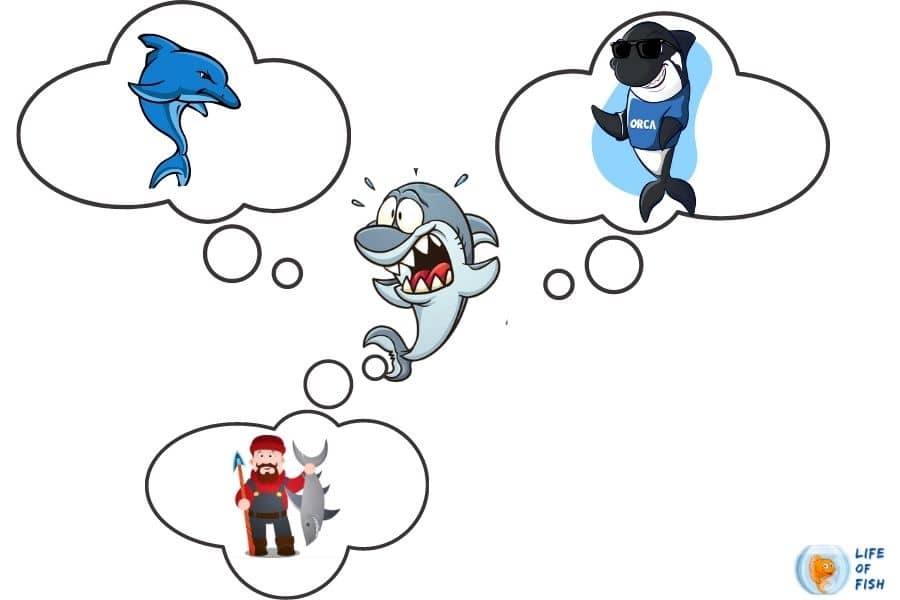
What Are Sharks Afraid Of?
Jump To
Sharks can get found in shallow and deep seas across the globe. Some species travel great distances to reproduce or feed.
While some species prefer to be by themselves, others prefer to be with groups of different sizes.
Let’s take a look at how different sharks interact and What are Sharks Afraid of?
Why are Sharks afraid of orcs?
We, humans, tend to believe that we are the only ones who know everything. Nature cannot get seen in black-and-white. The fear of death is influential on the behavior of animals.
These sharks, the world’s greatest predators, have been around for millions of years and have perfected themselves to become the ocean’s most dangerous killers. But the 2017 demise of great white sharks has shaken this belief.
On South Africa’s Western Cape Province coast, five great white shark carcasses were discovered (washed up on shore).
The three males and two females measured nine to sixteen feet in length with punctured pectoral fins and livers.
The deaths of five great white sharks are attributed to killer whales, also known as orca whales.
Given their reputation, you might assume that sharks don’t have to be afraid of anything in the ocean. But no, sharks have something to be afraid of; it turns out sharks fear killer whales.
Why are Orcas after sharks?
killer whales target specific types of tissue with high lipid content and prey items.
Meantime, shark livers are enormous and lipid-rich, accounting for up to one-third of the animal’s total mass.
Orcas may prey on shark livers because they are heavy in fat and delicious. In the same way, humans use butter and bacon because we enjoy fatty foods so much.
In the reported attacks (by orcas) there were no bite marks or injuries visible on the pectoral fins of sharks.
It suggests that shark-feeding killer whales may be using a specialized way to access the sharks’ livers.

Do sharks avoid regions where orcas are present?
Researchers discovered that white sharks avoid areas where orcas are present and refuse to return for long periods. It may prevent them from dealing with the species they fear.
According to reports, Most of what we know about white shark/orca interactions is detrimental to sharks.
When killer whales arrived, sharks departed the region and, in many cases, did not return for months.
Killer whales can have top-down effects in many settings – They lower other predator populations directly by their consumption.
Sharks and Orcas Collision
One such case was reported in Farallones island. These federally protected islands house a small and concentrated population of elephant sealings. They are essential white shark prey and can sometimes prey by transient orcas.
In November 2009, two orcas arrived at Farallones. Observers saw two orcas scavenging seals.
Interestingly islanders did not see the white sharks again until the next hunting season.
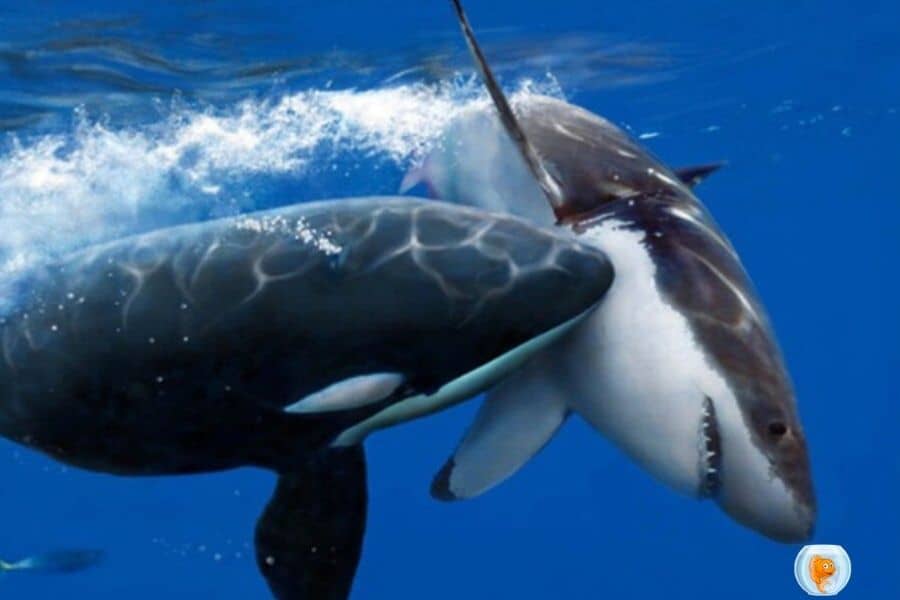
Are Sharks afraid of human?
Sharks have a reputation for being ferocious man-eaters, as we’ve witnessed over the years. However, these sharks seldom bite without provocation.
These sharks might not be out to hurt us, but they are just curious.
Things that are foreign to us get perceived as dangerous and scary. Fear was an adaptive mechanism to protect and survive.
Many things were not known to humans initially, so most animals, including sharks, were feared.
Why do humans have such a fear of sharks?
Many thighs trigger fear of sharks including favorite moves like Jaws. What are other factors?
Psychological Fear
As humans, we respond more to feelings than concepts; thus, when we think of a shark, the “feelings” come to mind first and are more vigorous than “thoughts,” such as how improbable it is that we will encounter one.
Facts
There are around 70 to 100 shark attacks each year around the globe. These attacks result in only 5-15 percent of fatalities.
According to the research, you have a 1 in 11.5 million chance of being attacked by a shark.
However, being Killed by a shark is extremely unlikely. But every year, humans kill roughly 100 million sharks. It is the equivalent of killing almost 11,000 sharks per hour.
We may claim that sharks should be scared of humans based on the stated facts.
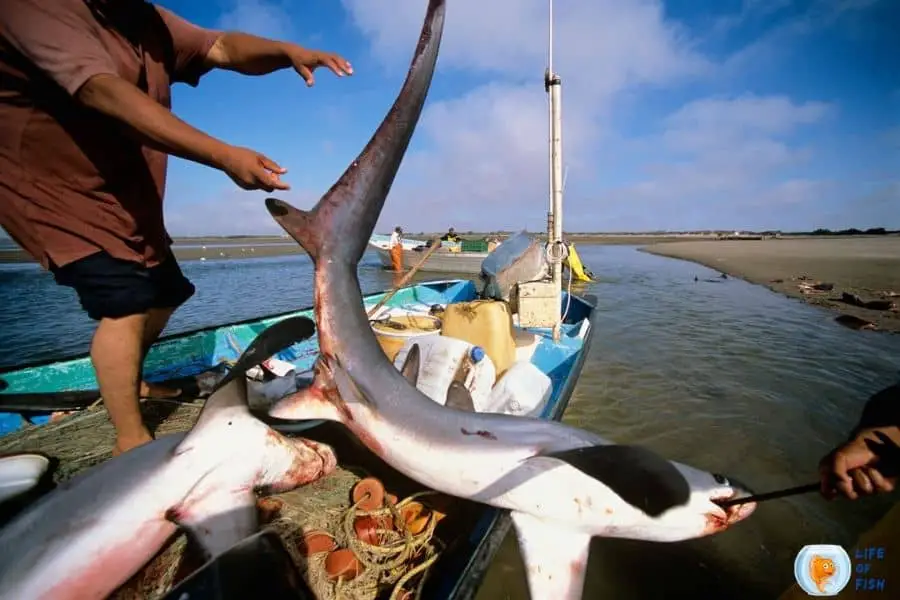
The impact of Hollywood Blockbuster
Jaws (movie), the horrific motion film based on the terrifying No. 1 best seller book, has influenced how many of us think about sharks.
On the other hand, these creatures do not deserve their vicious reputation. Even feeding the goldfish felt dangerous after watching this movie.
The prospect of an enormous great white shark with a nasty attitude approaching a beach near you had people enthralled in cinemas all around the world.
Jaws’ portrayal of sharks in a vicious, evil way was a serious flaw. The story centers on a shark that appears to be pursuing certain people in an attempt to kill them.
It had a lasting effect on our collective psyche. As the sleek shape of the shark soared forward, our fear of sharks became apparent.
Some large shark species do attack humans. Around ten people are killed every year by a bull, great white, and tiger sharks.
They mostly die from trauma. There are two reasons for shark attacks.
The first one is sharks can confuse swimmers with their usual food, seals. And the second reason is, if they splash around in the water or wear bright items that look like fish skin.
After that, the sharks take a nibble to test if we’re edible. They’ll spit us out if they do.
Forty years ago, Jaws altered the way we thought about water. It is now slowly but surely, losing its grip.
A growing awareness of sharks is growing, along with concern for their welfare.

Dolphins vs. Sharks – Who is dominant? Who is afraid?
Although the bottlenose dolphin seems a gentle and peaceful sea creature, most people don’t know its violent nature.
It is especially true when they live in large groups, also known as a pod. Even sharks don’t know that pods can cause harm to them.
Dolphins can outmaneuver sharks in a single-on-one battle, mainly because of their physical characteristics.
The dolphin’s incredible mobility and vertically-oriented rear fin give it a lot of flexibility. Sharks, on the other side, have horizontally oriented rear fins and are less flexible than dolphins.
It puts sharks at a severe disadvantage when a pod of dolphins confronts them.
Dolphins may use their noses (snouts) to strike sharks’ stomachs. It can cause damage to the shark’s internal organs or prevent it from breathing.
It can cause the death of the shark. Some sharks can run away from fights when they realize they are in danger.
But if the shark stands firm, the dolphins might prove that they are the dominant species of the sea.
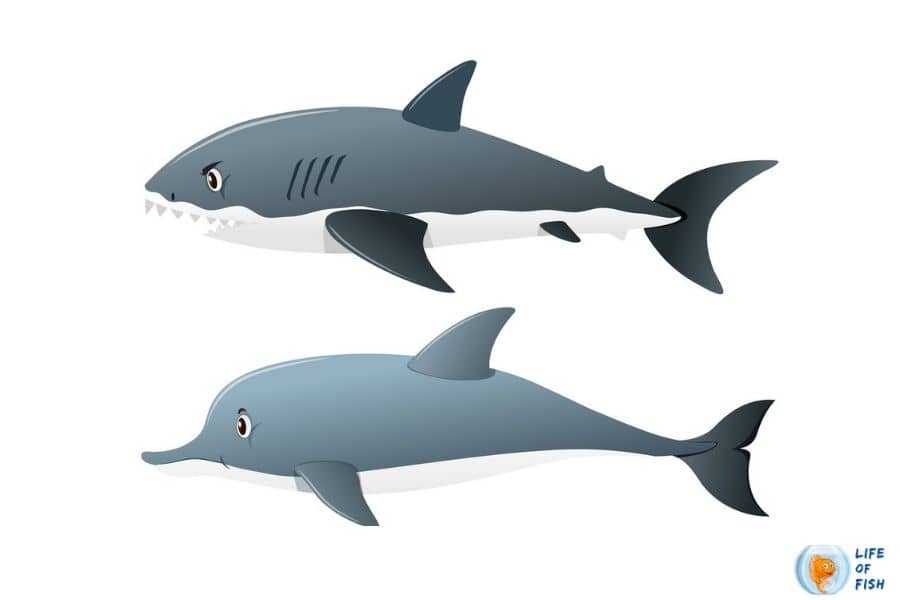
Colors Sharks Afraid of
According to facts, sharks don’t fear any color. However, they are more attracted to yellow. Several scientists and shark experts refer to Yellow as “Yum Yum Yellow”.
According to tests, they get most likely drawn to what we call yellow because it is a bright item against the dark background of the water.
However, recent studies show the majority of sharks are colorblind.
The essential brain machinery of the retina is missing in these sharks, which allows them to compare items according to their spectrum reflectance.
They are only able to distinguish between brightness differences only.
Importance of Sharks in EcoSystem
In marine environments, sharks are the top predators. Sharks utilize fear to manipulate their prey species’ behavior and distribution.
This indirect management of prey species has the potential to have an impact on the larger ecosystem.
Why Oceans Need Sharks
Sharks also play an essential part in ecosystem protection, such as seagrass meadows and coral reefs.
What happens if top predators like sharks don’t exist in specific environments? Sea turtles and stingrays might become more abundant. Overgrazing by these species might lead to habitat loss.
If there aren’t any sharks around to scare sea turtle populations, overabundant turtles could graze in one area, decimating seagrass ecosystems.
Sharks can force turtles to spread across more extensive areas of seagrass. A lack of healthy seagrass habitat can cause fish populations to decline.
What puts the shark’s population in jeopardy?
Sharks have been eradicated from so many ocean regions that there are now just a few excellent examples of their relevance to ocean ecosystems.
- Mangrove destruction, coastal development, and poor water quality due to pollution all jeopardize sharks’ habitats. Sharks that dwell in coastal and freshwater environments are the most susceptible (near human activity).
- Human contamination of shark habitats is more than just a nuisance. As sharks eat on chemically tainted food, toxins such as mercury and DDT can build up in their tissue over time. Sharks, like other water animals, can become entangled in or ingest physical plastic waste.
- Commercial fisheries catch an estimated 50 million sharks accidentally each year. Due to the tremendous demand for shark fins are occasionally chopped off and tossed into the water to perish.
Conclusion
We may not be a significant threat to sharks, but they are to us. Shark populations have been declining dramatically as a result of human activity.
Sharks must get protected, and populations must be allowed to recover to restore the health of our seas.
Rather than being concerned about sharks, you may wish for them and assist them.
Rather than being concerned about sharks, think about how you might make their water safer. After all, it’s their home, and we’re only passing through.
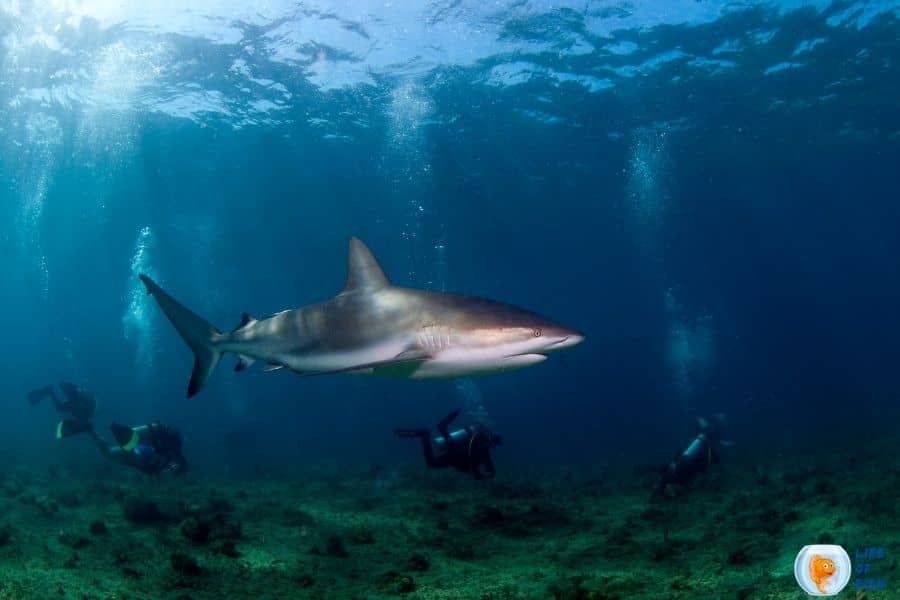
Reference
Engelbrecht, T.M., Kock, A.A. and O’Riain, M.J., 2019. Running scared: when predators become prey. Ecosphere, 10(1), p.e02531.
Jorgensen, S.J., Anderson, S., Ferretti, F., Tietz, J.R., Chapple, T., Kanive, P., Bradley, R.W., Moxley, J.H. and Block, B.A., 2019. Killer whales redistribute white shark foraging pressure on seals. Scientific reports, 9(1), pp.1-9.
Tester, A.L., 1961. A Summary of Research on Sharks.
Read Next : Drumfish | Did You Know These Fascinating Facts ?
